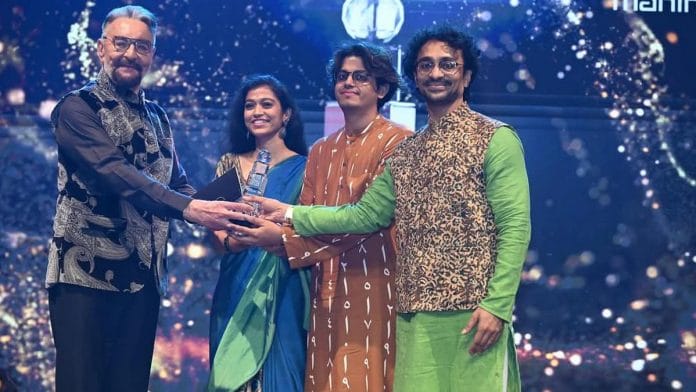Kolkata: Is theatre now the flagbearer of Bengal’s claim to being India’s cultural capital, as literature and cinema go through a muted phase?
In literature, Bengal fell off the Sahitya Akademi awards list this year, officially because of “technical” reasons but more likely political. In cinema, Aparajito—Aneek Dutta’s film on how Satyajit Ray made his classic Pather Panchali—just about saved the day, picking up plaudits for best make-up and set design in the National Film Awards. But it is in theatre that Bengal is on a winning streak.
On 20 March, at the Mahindra Excellence in Theatre Awards (META), now in its 20th year, two entries from the state bagged nine of the 13 awards—perhaps Bengal’s biggest-ever haul at India’s most prestigious theatre awards.
Nishango Ishwar, presented by the Bengal Repertory, won five awards. It was the first time the low-profile group was competing. The other Bengal play, Chandaa Bedni, got four awards. It was produced by Rangakarmee, the group founded by the late thespian Usha Ganguly in 1976, but for 35-year-old Anirudh Sarkar it was a directorial debut.
Between the two plays, the oldest artist is Suman Saha, 42, who won Best Actor for Nishango Ishwar. The Best Actress award went to 22-year-old Ranjini Ghosh of Chandaa Bedni, who estimates the average age of the play’s 33-member cast is around 25. Bengal’s theatre is clearly drawing fresh talent—and it’s going places.
“Even if I had not got the Best Actress award, I would have continued to work in theatre,” said Ghosh, an alumna of La Martiniere for Girls and a BCom grad from St. Xavier’s. She’s currently trying to juggle performances with an MBA course in Mumbai, starting later this year.
“I think young people today have very clear dreams and passions, and parents these days are supporting them. Like mine have always,” she added.
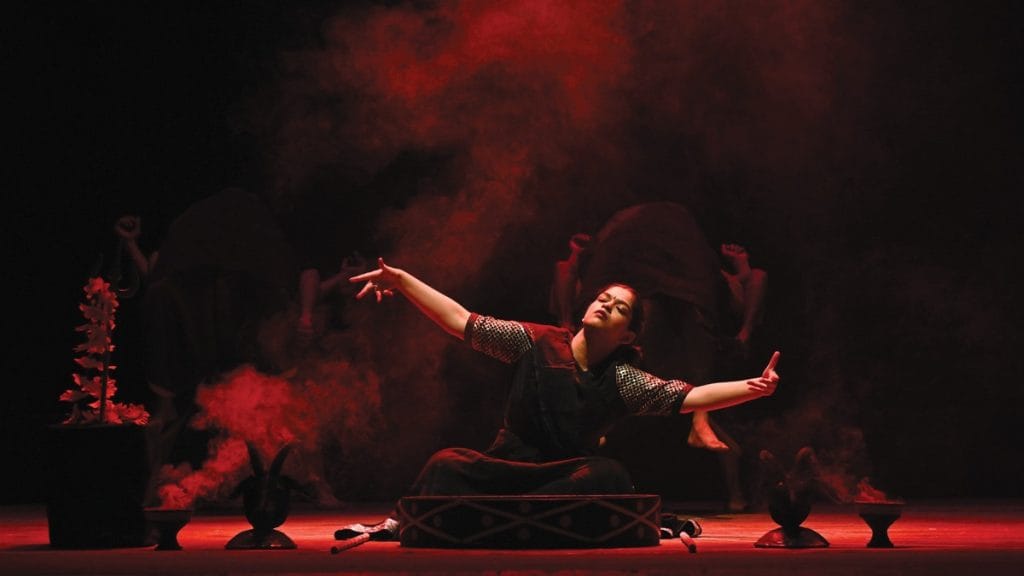
Best Actor-winner Saha had a harder time convincing his family. His refugee parents couldn’t imagine theatre as a full-time profession. To them, it was something people did after office hours. They were worried when, after graduating from Manindra Chandra College, he signed up for a Sangeet Natak theatre camp and then plunged into theatre full-time. But, at age 28, just as he began getting recognition, he gave it all up to train with his guru, Sangeet Natak awardee Kalamandalam Piyal Bhattacharya, in abhinaya—an ancient Indian tradition of theatre.
“Acting is a very general term. Abhinaya is vast. And different from modern theatre in context, content, design, narrative style and performance. I have used abhinaya in Nishango Ishwar, we practiced hard. And it is wonderful the play has won recognition,” said Saha.
He’s now hunting for a hall to stage it in Kolkata. Since its debut in 2022, the play has been performed only 11 times, including at Delhi’s Kamani Auditorium and Shri Ram Centre for META.
“It’s so difficult to get a hall these days,” said Saha. “But yes, there are a bunch of young actors and directors who are taking Bengal’s tradition of great theatre forward.”
Also Read: Mughal gold to Mexican shawls—the journey of Bengal’s forgotten fabrics is now being revived
The two plays
There are only two characters in Nishango Ishwar, the Bengali play that swept five of the awards. One is an idol of Lord Krishna, sitting on stage. The blue god with the flute. Frozen. Like a stone statue, or a three-dimensional cut-out. Around him is his human alter ego, voicing the question that haunts him: Were my plans, dreams, and actions in vain?
In the rear-view mirror, there are glimpses of Krishna’s failures as a god, as his human version—played by Suman Saha—slips in and out of the characters that populated his life: Gandhari, Yudhishthira, Krishna himself, and at times a narrator who questions his decisions. Drawing unmistakably from ancient Indian performance traditions, the play tells of the tragedy of being made an incarnation—unable to confess failure, compelled to live up to a god-image, cursed to live a lie.
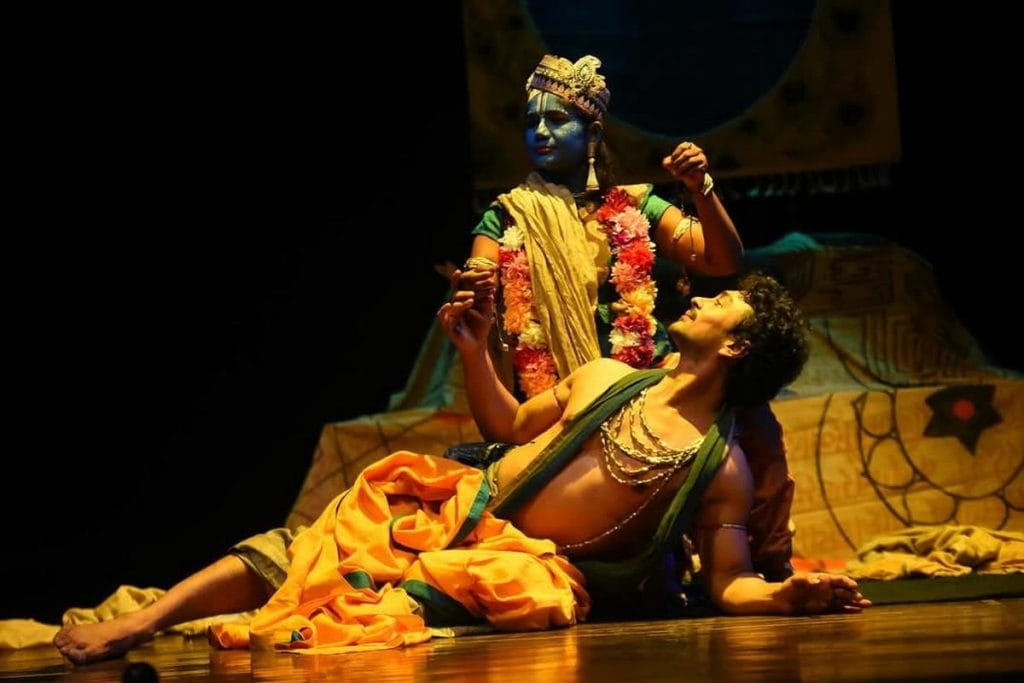
One of the human Krishna’s most moving lines: “I am not the god. I am not a stone idol. I am human too. Despite a yogic lifestyle, in my body too, Shadaripu is wielding its weapons.”
Shadripu in Hindu theology refers to ‘six enemies’— vices such as lust, anger, greed—that hinder spiritual growth.
The actress who plays Lord Krishna, Chandrani Sarkar, won the award for Best Supporting Role, well-deserved for sitting motionless for the entire 80-minute play. She moves her arms and head only when the human Krishna moves them as part of his performance, much like a marionette.
The play won Best Original Script for co-writers Suman Saha and Soham Gupta. Saha also went home with the awards for Best Set Design and Best Production
Chandaa Bedni is different. It is a folksy, gaudy spectacle based on a play that was reportedly first staged in Nagpur in 1983, written by Bhopal playwright Alakhnandan. Ranjini Ghosh plays Chandaa, a folk courtesan whose story is marked by bias, exploitative politics, and betrayal by the powers that be, ultimately killing her.
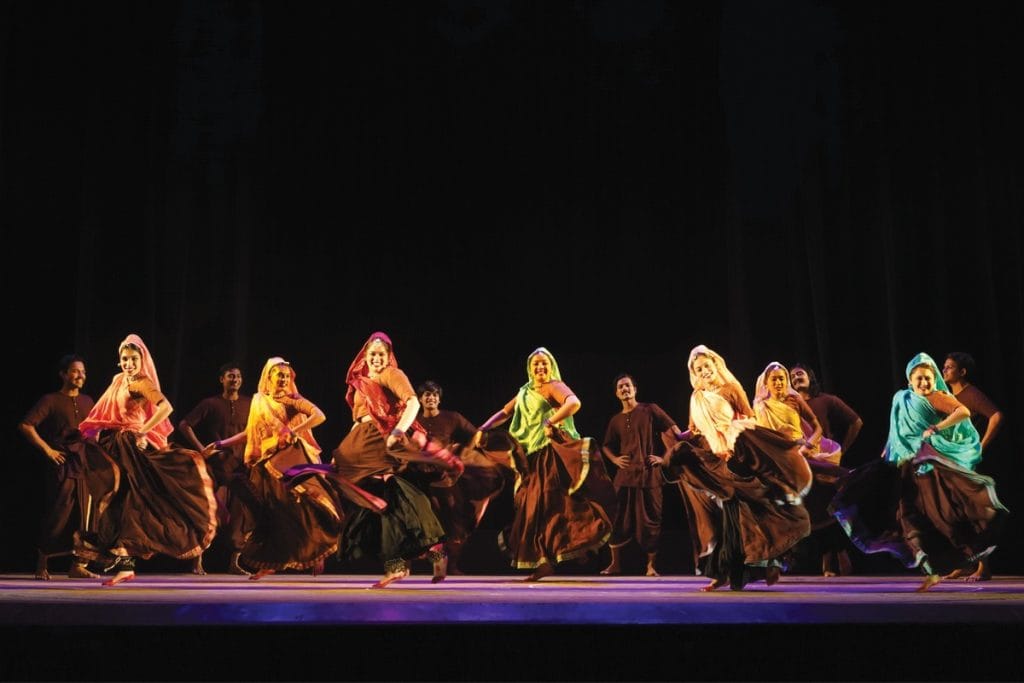
“We chose the script because it was a theme that would have appealed to Usha Ma’am,” said director Anirudh Sarkar. “We staged it for the first time in Kolkata on August 18 last year. That coincided with the protests over the rape and murder of the woman doctor at RG Kar. And the play received a lot of attention.”
In addition to Best Actress, Chandaa Bedni won Best Choreography for Subhojiet Guha and Madhumita Chakraborty, Best Light Design for Badal Das, and shared the Best Ensemble award with a Haryana production, Swang: Jas Ki Tas.
Also Read: Akshara Theatre is a Delhi gem, and a lifeline for small artists
Ignored, underfunded, but outspoken
Bengal’s big haul doesn’t surprise academic and theatre critic Ananda Lal, who regularly reviews plays on his website kolkatatheatre.com and served on the META jury some years ago.
“That nothing is happening in Bengali theatre is fake news,” he said. But he rues that not a single publication in Kolkata highlighted the META sweep. “The media goes where the money is. And you simply can’t compare the budgets for cinema and theatre.”
Lal saw Chandaa Bedni in Bhopal some 20 years ago, but has not seen either of the two META winners in their current form. He does recall Suman Saha’s performance in Medea, a Kolkata production of the Greek play by Euripides.
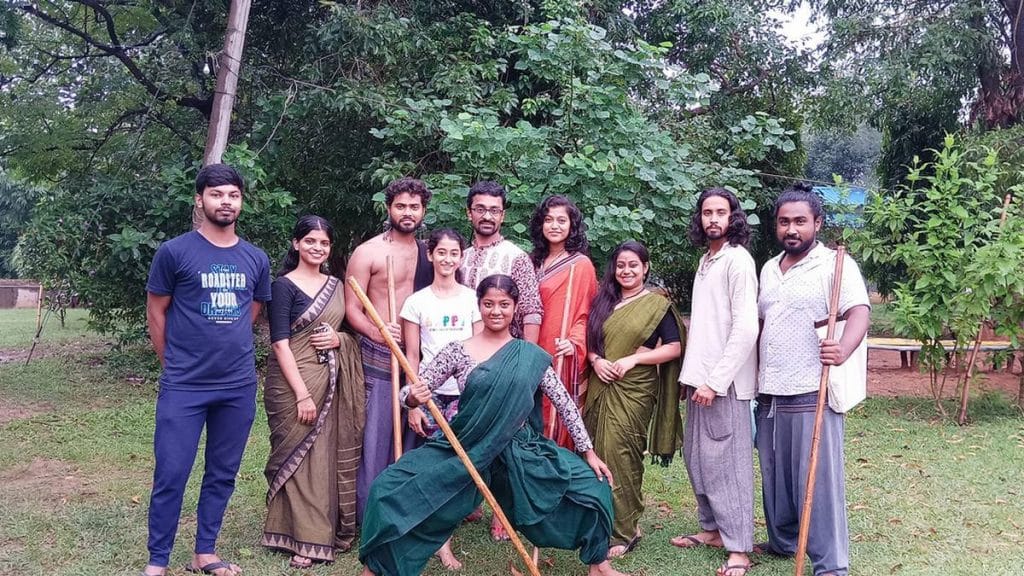
“Saha played three roles in the play—Jason, Creon, Aegeus—and he distinguished each so brilliantly, you don’t feel it was the same person playing the roles,” said Lal. He hopes the META awards will help both theatre groups stage shows in Kolkata soon. “Rangakarmee will survive, it’s an old group,” he added. “But how many shows has Nishango Ishwar done? How do they manage to stay afloat?”
Both Bengal Repertory and Rangakarmee receive central government grants from the Ministry of Culture—but they allege the funds don’t come through regularly.
“We haven’t got our grant for the last two years. How can we sustain ourselves?” said Suman Saha.
Bengal has an annual Rs 50,000 grant for theatre groups, but with around 4,000 registered groups—the highest in the country—the state can only stretch its support so far.
And there is politics. “If you tell the ruling party I support you, you will get halls and shows. If you don’t do that, nothing,” said Saha. “I cannot do that.”
But that’s not stopping Bengal’s theatre groups from speaking their mind.
“Anti-establishment (work) is decreasing in north India,” said Lal. “Mumbai has its own problems. It is theatre in Bengal that is by far the most outspoken and politically forthright. You can still do things here that you can’t dream of doing outside Bengal. People applaud that.”
(Edited by Asavari Singh)



